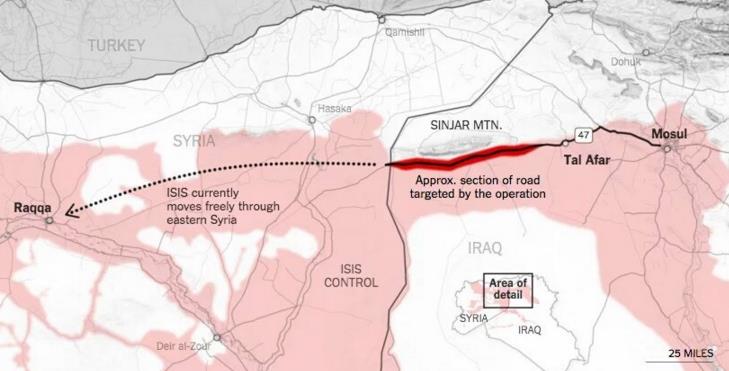It’s no secret that the American-led anti-ISIS coalition is planning an assault on the groups “capital,” the Syrian city of Raqqa — in fact, it’s so unsecret that the US Secretary of Defense has talked openly about the plan in front of Congress. A force of mostly Kurds, along with a group of Arab fighters called the “Syrian Arab Coalition” (which may not actually be a reliable fighting force, but I digress), are preparing to advance on Raqqa, bolstered by American weapons, special forces advisers/trainers, and air cover.
The timeframe for the actual attack on Raqqa isn’t yet clear, but it looks like the preparations may be underway, and they involve finally liberating the site of some of ISIS’s earliest brutalities: Sinjar. A force of Kurds and Yazidis, under coalition air cover, are advancing on the town and its surrounding countryside:
As many as 7,500 Kurdish pesh merga fighters were moving on “three fronts to cordon off Sinjar City, take control of ISIL’s strategic supply routes, and establish a significant buffer zone to protect the city and its inhabitants from incoming artillery,” the security council of the Kurdish autonomous region in Iraq said in a statement, using an acronym for the Islamic State.
Describing the unfolding battle, Kurdish officials said that pesh merga forces had taken the village of Gabara, west of Sinjar, and had cut the supply line, Highway 47, the major east-west road that connects Syria to Mosul, Iraq’s second-largest city, and that serves as a lifeline for the Islamic State, also known as ISIS.
Liberating Sinjar and the Yazidis who never made it out of there is obviously important in its own right, but cutting off that highway could have much bigger implications for future operations. Route 47 is part of the main stretch of roads connecting Raqqa with Mosul, Iraq’s second-largest city and the biggest city under ISIS’s control. Controlling the highway won’t stop ISIS’s cross-border traffic, but it does hamper it significantly. It forces ISIS vehicles traveling between Iraq and Syria to take longer and slower routes, which could conceivably make them more vulnerable to air strikes. Taking the road will also help coalition ground forces to project force into the border area, which may be the real key to isolating Raqqa and Mosul from one another. You can see the main Raqqa-Mosul artery in this map:
https://twitter.com/erinmcunningham/status/664769189991874560
And here’s another look, highlighting the area targeted by the Kurdish-Yazidi force:

I’ve seen some reporting that describes this move as an effort to isolate Mosul from Syria, but nobody in Iraq is ready to try to retake Mosul yet; it’s not even clear they’re ready to retake Ramadi, which is a much easier target. To be sure, cutting the highway may well have some long-term ramifications by way of weakening ISIS’s position in Mosul. However, the forces are sliding into place to make a major assault on Raqqa fairly soon, and while degrading ISIS’s cross-border traffic makes it harder for them to get men and materiel from Syria into Iraq, it also works the other way around. This may well be the early stages of the Raqqa operation.
Hey, thanks for reading! If you come here often, and you like what I do, would you please consider contributing something (sorry, that page is a work in progress) to keeping this place running and me out of debtor’s prison? Also, while you’re out there on the internet tubes, please consider liking this blog’s Facebook page and following me on Twitter! Thank you!
